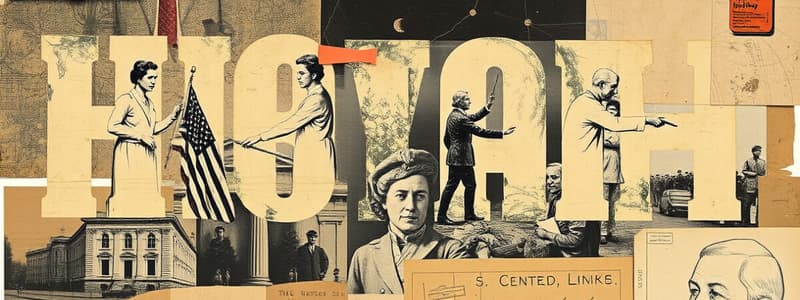Podcast
Questions and Answers
What does the term 'Historia' refer to in the context of history?
What does the term 'Historia' refer to in the context of history?
- A record of past events
- Knowledge acquired through inquiry or investigation (correct)
- Chronological documentation of significant events
- Collection of historical artifacts
A document is not necessary to establish a historical fact.
A document is not necessary to establish a historical fact.
False (B)
What are the two main divisions of history discussed?
What are the two main divisions of history discussed?
Prehistory and History
Historical writing is based on critical examination of sources and involves _____ of details into a narrative.
Historical writing is based on critical examination of sources and involves _____ of details into a narrative.
Match the following historical concepts with their definitions:
Match the following historical concepts with their definitions:
What is a primary source?
What is a primary source?
Secondary sources provide unfiltered access to the past.
Secondary sources provide unfiltered access to the past.
Name one advantage of using primary sources.
Name one advantage of using primary sources.
Primary sources can include diaries, letters, and ___.
Primary sources can include diaries, letters, and ___.
Match the following inquiries to their descriptions regarding primary sources:
Match the following inquiries to their descriptions regarding primary sources:
Flashcards are hidden until you start studying
Study Notes
Meaning and Relevance of History
- History is the study of the past, encompassing significant events and their causes.
- The term "history" originates from the Greek word "Historia," meaning knowledge acquired through inquiry or investigation.
- Without written documents to verify events, they cannot be classified as historical facts.
Valid Historical Documents
- Types of valid historical documents include:
- Government records
- Chronicles
- Personal letters
- Receipts
- Diaries
- Artifacts
- Architecture
Divisions of History
- Prehistory:
- The period without written records, analyzed through fossils and artifacts.
- History:
- Marks the period when writing began, allowing for documentation of events.
- Analyzed through inscriptions, metals, papyrus, and written papers.
History vs. Historiography
- Historiography involves writing history by critically examining sources and details to form a narrative.
- Historical research employs specific methodologies to guide the process.
Importance of History
- History plays a vital role in:
- Uniting nations.
- Legitimizing regimes and fostering collective identity.
- Providing context for the present.
- Preventing repetition of past mistakes.
- Inspiring positive social practices.
Primary and Secondary Sources
- Primary sources are firsthand testimonies produced during the event, such as:
- Diaries
- Letters
- Interviews
- Photographs
- Secondary sources are interpretations of primary sources, typically created after events, including:
- Books
- Theses
- Journals
Evaluating Primary Sources
- Key inquiries include:
- Date of production
- Localization of origin
- Authorship
- Basis for its production
- Integrity of the original form
- Credibility of content
Advantages of Primary Sources
- Provide unfiltered insights into the past, reflecting artistic, social, and political thoughts.
- Unique documents capture the essence of life during specific historical periods.
Disadvantages of Primary Sources
- Often lack completeness and context, requiring cross-analysis with other sources to understand patterns.
Internal Criticism
- Focuses on the truthfulness of evidence by examining:
- The author's background and intention.
- Content context during its production.
- Factors for evaluation:
- Genealogy and authenticity
- Origin and creation context
- Interpretation and intended meanings
- Authorial authority and competence
External Criticism
- Involves verifying document authenticity through physical characteristics, assessing:
- Accurate and authentic sources
- Documents that mislead or falsely represent authorship
- Understanding the political and contextual implications of misleading documents is essential for historiography.
Studying That Suits You
Use AI to generate personalized quizzes and flashcards to suit your learning preferences.




